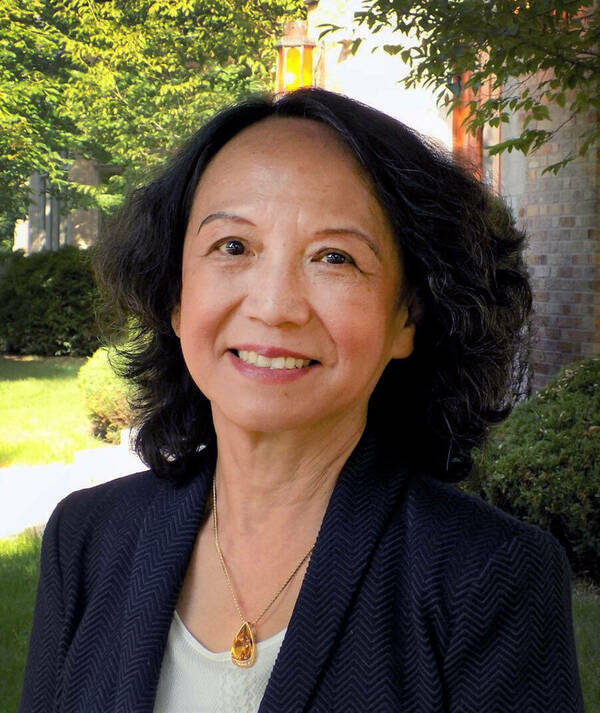
Mei-Chi Shaw, professor in the Department of Mathematics at the University of Notre Dame, has been awarded the Bergman Prize from the American Mathematical Society for her lifelong contribution to several complex variables, partial differential equations, and Cauchy-Riemann geometry.

“I am deeply honored to be awarded the Bergman Prize. Growing up in a large military family that fled Mainland China to Taiwan in 1949, becoming a mathematician was almost an impossible dream,” Shaw said in her response to the Bergman Prize announcement. “Yet with the support of my family, teachers, and collaborators, I have had the privilege of doing what I like for a living: solving mathematical puzzles in several complex variables.”
The Bergman Prize honors the memory of Stefan Bergman, best known for his research in several complex variables. Awards are made every year or two in either the theory of the kernel function and its applications in real and complex analysis, or for function-theoretic methods in the theory of partial differential equations of elliptical type, with attention to Bergman’s operator method.
Shaw, who shared this year’s prize with Franc Forstneric of the University of Ljublijana (Slovenia), is just the second woman to have received the prize since its inception in 1989. She and Forstneric will split the $24,000 cash award, the 2019 income from the Stefan Bergman Trust.
Shaw joined the University of Notre Dame faculty in 1987 as an associate professor of mathematics. She graduated with an undergraduate degree in mathematics from National Taiwan University and earned her doctoral degree in mathematics from Princeton University, where she was advised by the acclaimed mathematician Joseph J. Kohn. After graduation, she worked as a postdoctoral researcher at Purdue University, as a tenure-track faculty member at Texas A&M University, and later the University of Houston.
At Princeton, Kohn told Shaw about a problem on domains that are not smooth. This initial problem ignited her life-long passion on non-smooth domains, where she has made significant contributions to the field. Classical mathematics often assumes smooth domains, and her collective work is the result of deep understanding of the role that harmonic analysis plays in several complex variables and partial differential equations.
In addition to her research and teaching, Shaw has written a seminal textbook, “Partial Differential Equations in Several Complex Variables” with So-Chin Chen.
"We are very pleased that Professor Shaw's research has been recognized by the American Mathematical Society," said Mary Galvin, the William K. Warren Foundation Dean of the College of Science. "The work she has pursued at Notre Dame in several complex variables and partial differential equations has advanced the field, and her textbook has introduced many students to the concepts in an unambiguous way, allowing her to share her knowledge widely."
When Shaw was a girl, she didn’t know that she wanted to be a mathematician. At first she thought she wanted to go into biology, but she did not enjoy her experiences of dissecting frogs. A mathematics teacher during her senior year encouraged her to pursue math as a career, but at times she was skeptical, even after graduating with a mathematics degree in college with top honors. She applied to Princeton and Harvard for doctoral programs in mathematics and statistics respectively. She wanted to become a mathematician, but she thought statistics could be a safer choice.
“And then I talked to my mother, who was a feminist, and who went to Wuhan University but did not graduate,” Shaw said. “She wanted to make sure her daughters did not repeat this. When I told her I didn’t know which I should study, she scolded me. She said, ‘if you want to study mathematics, just do it!’”
Shaw’s sister, Margaret Wu, was inducted into the National Academy of Engineering in 2019.
When Shaw arrived at Princeton — as the first woman admitted in four years — and began taking classes, she was dismayed that she understood very little. The program was more about immersion than instruction and students were expected to jump in and learn. When she reached out to professor Elias Stein after a few weeks and admitted that she didn’t understand the concepts, she also asked, “Should I study mathematics?”
Professor Stein responded, “Since you are already here, why don’t you stick around?” He then gave Shaw two books, which she studied to the point that the bindings ripped and sections of pages began falling out. She still keeps the books at her desk in Hayes-Healey Hall.
Shaw shares this message with her students, because the field is difficult to break into for everyone, and especially for women. And when they come to her with questions about their mathematical abilities, Shaw frequently responds the way Stein responded to her.
“Since you are already here, why don’t you stick around?” she says, adding that through hard work, they should be able to meet their own goals.
“Our parents brought the family from Mainland China to Taiwan without knowing what the future would be.” Shaw said. “They had shown us by example the importance of hard work and perseverance. When I was given the once-in-a-life -time chance to study mathematics at Princeton, I thought, I cannot not try.”
Shaw worked as hard as she could both at graduate school and later as a professor. She proved her first important theorem when she was 29, in which she extended results of Hörmander (Fields medalist 1962) on Cauchy-Riemann equations to tangential Cauchy-Riemann equations.
Shaw has relished her research and teaching opportunities at Notre Dame, and her husband, Hsueh-Chia Chang, the Bayer Professor in the Department of Chemical and Biomolecular Engineering, was hired after Shaw received her offer in 1987. She is working on a second book with Charles Stanton that she plans to complete soon.
“I feel very honored to have won the Bergman Prize,” Shaw said. “It could not have come at a better time in my career.”